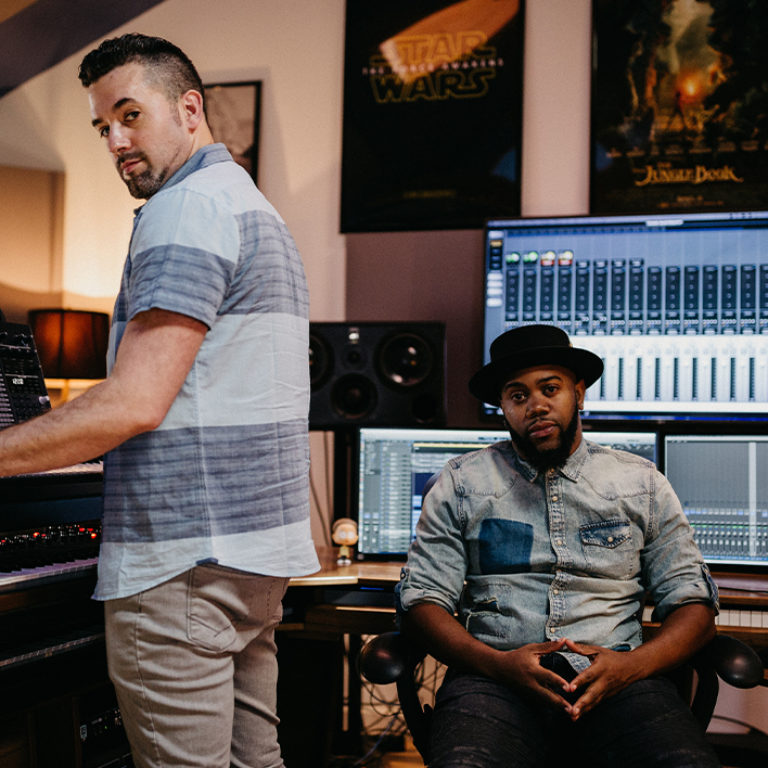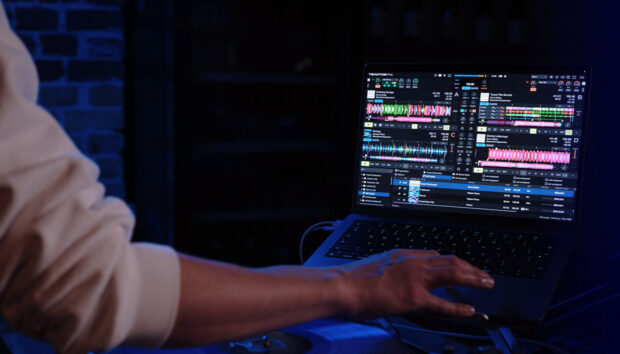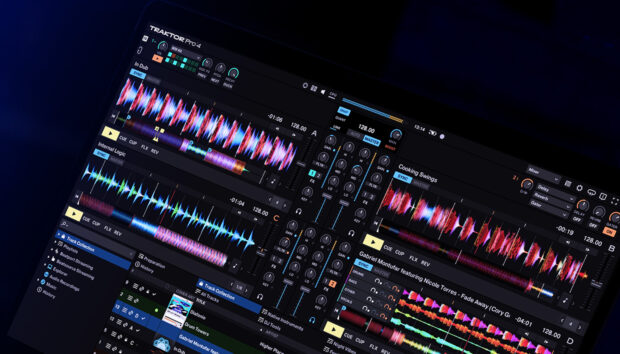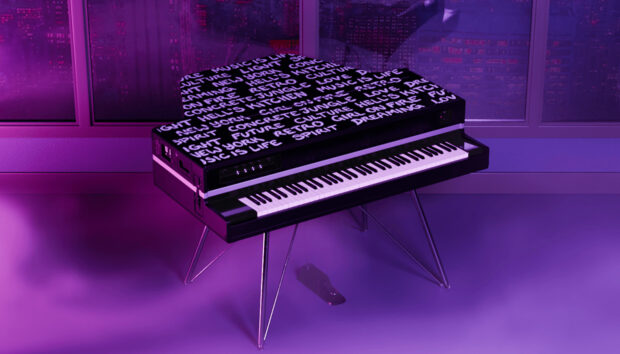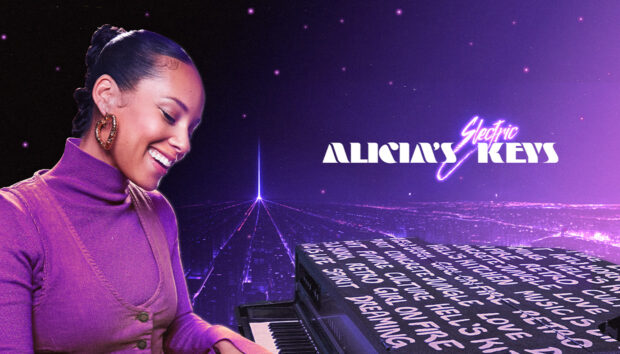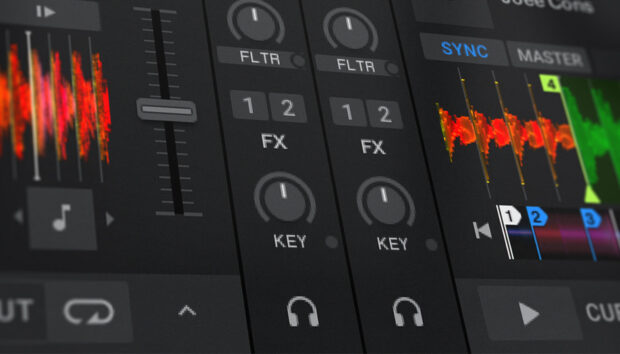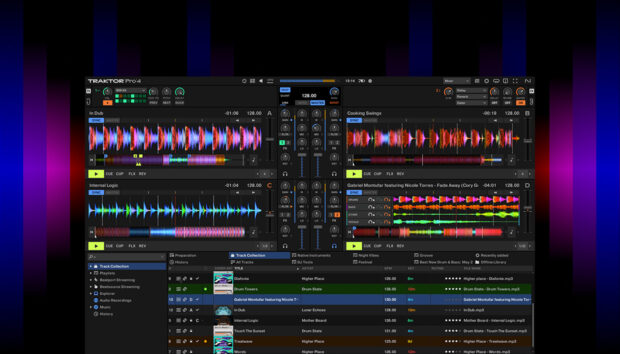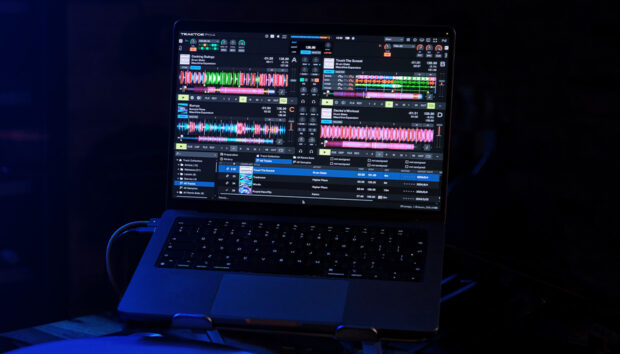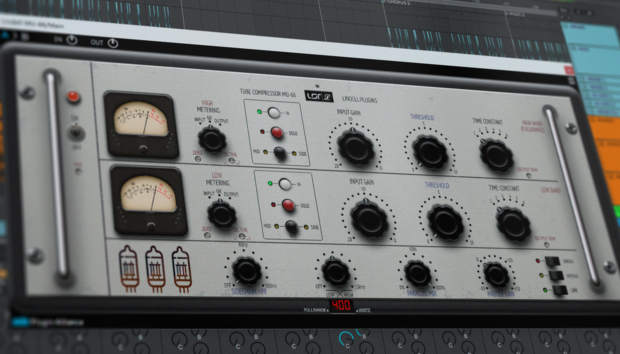The Wonder Years remains one of television’s most iconic and influential nostalgia trips – it’s both a love letter to the 1960s (when it was set) and a time capsule of the late 1980s (the original ran from 1988 to 1993). The show that introduced a generation to actor Fred Savage and immortalized Joe Cocker’s rendition of The Beatles’ “With A Little Help From My Friends” has now been newly rebooted for 2021 and it’s got a whole new soundtrack… albeit one that makes it sound like it’s 1968 all over again.
The new Wonder Years centers around 12-year-old Dean Williams (Elisha Williams) and his experiences growing up in a middle-class black family in Montgomery, Alabama in the mid-1960s; the great Don Cheadle narrates each episode as the adult Dean. Created by veteran producer Saladin Patterson with Fred Savage, the storyline is largely based on Patterson’s own musical family and his childhood in Albama. His father, Bill Patterson – who performed in a group called The Jays alongside future members of The Commodores – inspires the father in the show (also named Bill, and played by Dulé Hill), who is a music professor by day and a musician by night.
Doo-wop, funk, soul, jazz, Motown, and other authentic sounds of the ‘60s and ‘70s weave throughout the new Wonder Years with an inspiring authenticity. For show composers Jacob Yoffee and Roahn Hylton writing this soundtrack has been an exercise in world-building, and finding fresh ways to spin classic sounds. Yoffee, who comes from a classical and jazz background, and Hylton, a hip-hop and pop producer (who made Nicki Minaj’s massive hit “Super Bass”) first met in 2016 at a music conference in Israel; sharing a love of aliens, conspiracy theories, and music they decided to join forces, and have gone on to score LeBron James’ Best Shot, Kevin Hart’s Don’t F**K This Up, and Amazon’s Meek Mill documentary Free Meek. As we found out, scoring The Wonder Years is a dream come true for Hylton and Yoffee, something they literally manifested as they began experimenting with ’60s-inspired music during the pandemic. We caught up with the duo recently and they told us more capturing the sound of the ‘60s in the modern day, reimagining a TV classic, and the Native Instruments tools that helped them along the way.
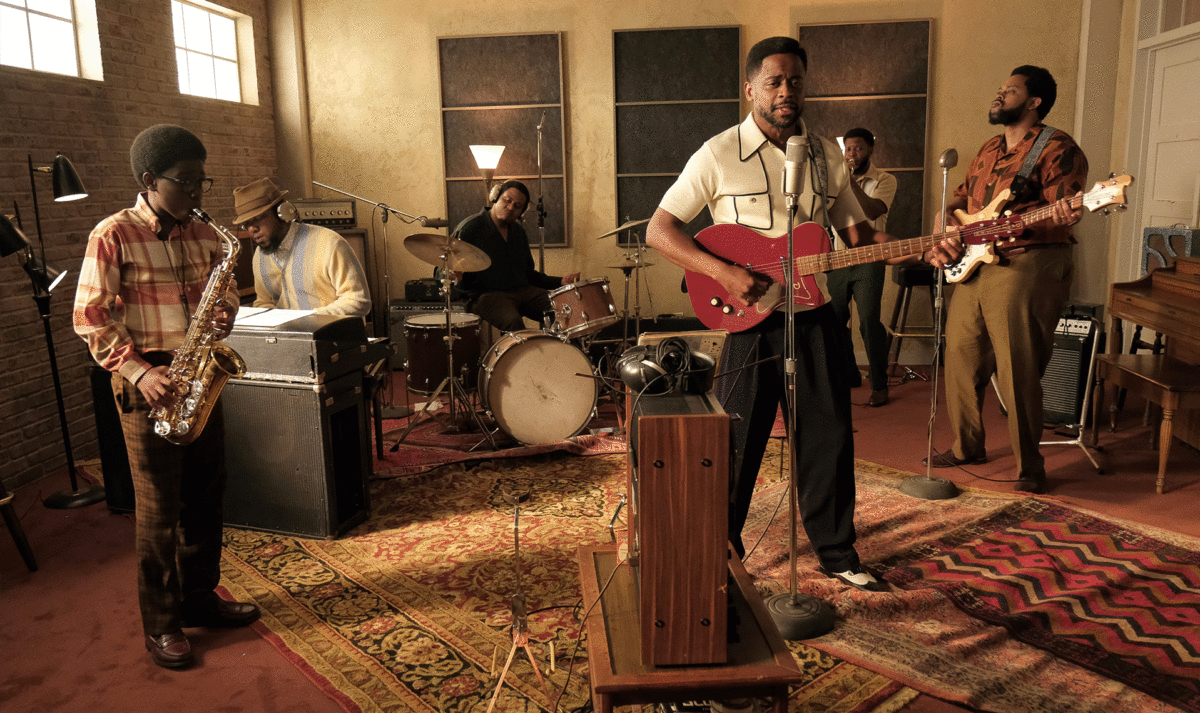
How did you guys begin thinking about this soundtrack? What were some of the major influences and was there any particular music you kept coming back to as a sort of guiding light?
Roahn Hylton: 2020 was crazy for all of us and some months were really touch-and-go in the music business. We were like, “Let’s just be as creative as we can and make music that we love, send it out, and maybe try to get it licensed.” We created an album based on the 1960s – doo-wop, a lot of The Platters, some Aretha Franklin – and sent it out to friends in Atlanta and New York to sing on. Then, about a year ago, we got an email saying “Would you guys be interested in meeting with some network executives?” You should demo for The Wonder Years” and we’re like, “Wait…we might already have some music for that.”
So we went back in again, did a lot of listening to Otis Redding, Marvin Gaye. We sat in that world a bit, thinking about how we would translate the ’60s from the perspective of this black family – which is soul music, something we both love – and we made even more music. We sent them about a 20-song demo, which just turned out to be a lifeline for us. They loved the demo; they kept on referencing that. It was another four or five months before we heard back and they’re like, “Hey guys, want to score the pilot?” Once we got picture back, some of the music was working but we wanted to go back to it. We listened to a lot of Roberta Flack and really dug into Bill Withers, which solidified some of the groove and the rhythm. We’re early on in the show, so as character themes begin to develop, we’ll see what works sonically.
Jacob Yoffee: When we first started working together, our dream was to fuse everything together, all the kinds of music we liked. We said “Why can’t we use 808s as an instrument in film scores? Why can’t we use a horn section mixed with a classic string ensemble?” We didn’t want anything to hold us back – we wanted to blur genres. Doing the demo in 2020 was a big inspiration for us. We thought, “How can we take some of these bands that we love from the ’60s and utilize that sound-world as score, as an instrumental approach to supporting storylines? The Wonder Years appeared, seemingly out of nowhere, and has become this amazing canvas for us to display this kind of approach.
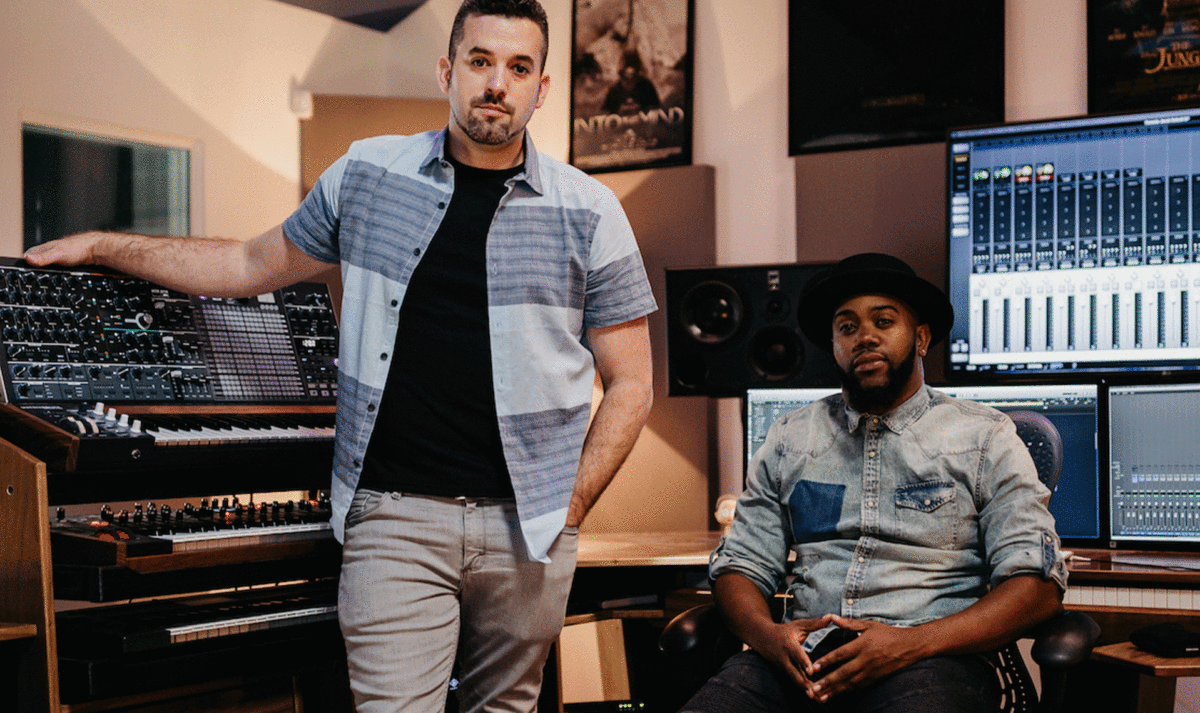
How do you approach a project and how do you like to work together as a team?
Hylton: Every project is its own universe. We both have unique skill sets musically and then we have overlap. Specifically on The Wonder Years, we’re literally sitting in this exact position for 16-18 hours a day and when we’re not together, we’re writing parts and sending things back to each other, verifying mixes. What really works for both of us is that there are two of us to go over melody ideas and say, “Hey, this doesn’t suck! That’s great.” We can make a lot of stuff, but we’ll second-guess ourselves. Classic musician, right? Having two people allows those ideas to flourish; it’s very collaborative.
We do a lot of sharing playlists with each other. I’ll often Shazam something and send it to him, like “Yo, this would be crazy for this.” That’s how The Wonder Years has been. There’s been other projects where I’ll start a complete whole idea, bring it into a Pro Tools or Logic session, and Jacob will adapt and change it. I’ll go through his hard drive – which is full of music he’s made in the past that he’s forgotten about – and be like, “Oh, this is amazing!” and then I’ll add stuff to it. He has vast experience in film music and I have vast experience in pop, so my sensibilities as a producer work very uniquely in the film world. Early on in one of our first projects, we would do these things called “camps” where, instead of writing music for an artist, we basically made the show the artist. And now, when we’re doing production for an artist, I’ll lean back on some film sensibilities and melodic ideas.
Yoffee: We’ve been asked before if [we split up the cues 50/50] and we each do half the work. I can 100% tell you that whenever we send cues that only one of us worked on, they always get kicked back. It’s like they subconsciously can tell. So it’s us sitting here with our brains listening and judging every note. There’s times where I’ll start an idea and he’ll be like, “Hey dude, drop that down 25 bpm” and it shifts and changes the whole feeling. So it’s like we’re in a band together, and we’re both looking at the picture or the episode, and we respond differently to the sequence; I’m like “I feel like this is too sad” and he’s like, “No, it’s not sad enough,” and it changes our approach. When you think about being a film composer, you have to take for granted that you’re good at creating music, but how you respond to the picture is the real game.
Hylton: A big thing that changes the way we collaborate is sheer speed. In the last two days, we’ve written ridiculous amounts of music. Having both of us there to be able to tweak, add-on, shift, pass, email, file, send – we’ve now got into a crazy momentum because we’ve had to. We’re just throwing all our logs in the fire and keeping the village warm. [laughs]
You’re working with a band as well as KONTAKT instruments that are based on real instruments. Were there any learning curves with so many different instruments going on in this show? Also, do you guys play physical instruments?
Hylton: Believe it or not, I’m classically trained on viola, but I don’t play viola anymore and I’m not gonna pretend I do either. [laughs]. But I do play bass, I do play keys. We get a lot of miles out of that Rickenbacker [bass] in KONTAKT. It sounds amazing. There’s a lot of different approaches and elements that we get to play with because there’s such a wide variety of styles of music, even within individual episodes. We go from soul and funk to jazz, so we’re just getting to put our hands in a lot of libraries that Native Instruments has. Getting to hear the magic of a real musician playing those with the slightly different articulations that a human would do is gorgeous. Every time we have a session, it’s like Christmas when we get the sessions back after sending them some cool stuff we mocked up.
Yoffee: I love the symphonic sound: strings, woodwinds, brass, the percussion. The longer I do music, the more I realize every genre and style of music is the orchestra. If you learn how to write correctly for an ensemble, it has all the colors that an orchestra as. What has blown my mind on this project is the [Hammond] organ. In my mind, the B3 is the string section of this ensemble. I play guitar (horribly) but I’ve written for it and the guitarist that we’re working on this show with, I’ve been working with him 16 years and he also plays bass. So a lot of the instruments we’ve written for extensively, but the B3 was something else – having the ability to record a real organ has really shaped things, like “Wow, I didn’t know it could be so gentle and soft.” It’s kind of the glue. So when you’re asking what was the one thing that was the “wild card,” I’d say the organ itself. Everything else we had a lot of familiarity with.
In regards to KONTAKT, we write everything and mock it up using the KONTAKT instruments. One would think that once we record live, we’re not using any of that stuff anymore, but that’s actually not the case. When it comes to film music, the number one rule is control. You can have an amazing performance from the live players, but it just doesn’t work to picture. It might draw your attention away from the dialogue. It might just be too energetic or too brash or not bright enough; no matter how much EQ, it might not match the punch that the sample library had. So despite recording live instrumentation, you’re always blending it and working with the MIDI as well. Every composer friend we have out here does this. It’s always a mix – it’s part of what gives you that extra bit of control.
Hylton: Also sometimes the show needs something yesterday. So you gotta get in there and make what you have work right now. And obviously we can’t call a session in New York when we get an email at 10PM on the West Coast, so we’re constantly using the MIDI/analog sandwich, if you will.
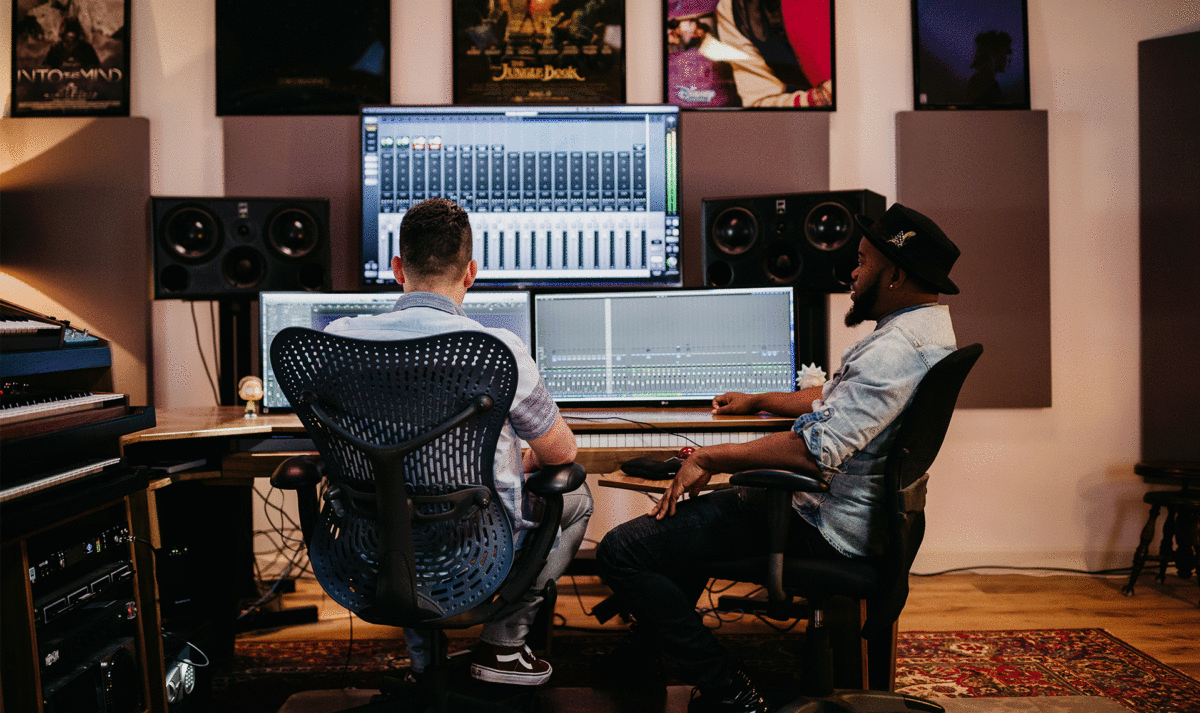
Are there any modifications you make within the individual KONTAKT instruments? For example, changing the articulations on the Rickenbacker or using the mixer inside Abbey Road drummer?
Hylton: Abbey Road Drummer gets probably even more play than Rickenbacker – when we’re doing drums, we use a lot of the Abbey Road drums. As far as articulations, yes. Let’s say we mock up and send off stuff for our band sessions, if we have other parts that we need to add on, we’re gonna get in there and get real detailed so it’s gonna sound as much like a live bass as possible – maybe add little flubs here and there or a little off-rhythm. Then we definitely have our “chain,” where we know how the band is gonna sound and how we want it to sound, no matter if we’re replacing a cymbal hit here or a hi-hat there or a bassline.
Yoffee: The mixer inside Abbey Road is amazing. The fact that you can go in and tweak the mics for the individual pieces of the kit is just fantastic. Especially if we capture something with a live drummer and it’s like “Oh man, if we just had one more hi-hat at the end to ring out…” You can go in and get the sample to match how the live drum sounded, and there’s no way the human ear could detect one passing off to the other. And then the Rickenbacker is just amazing – I love that you guys include snapshots, like in the presets, because that’s helped us really quickly get to something working well and then we can start EQing. It’s just like plug and play. We discovered it and looked at each other like “Oh, the game has been changed.” [laughs]
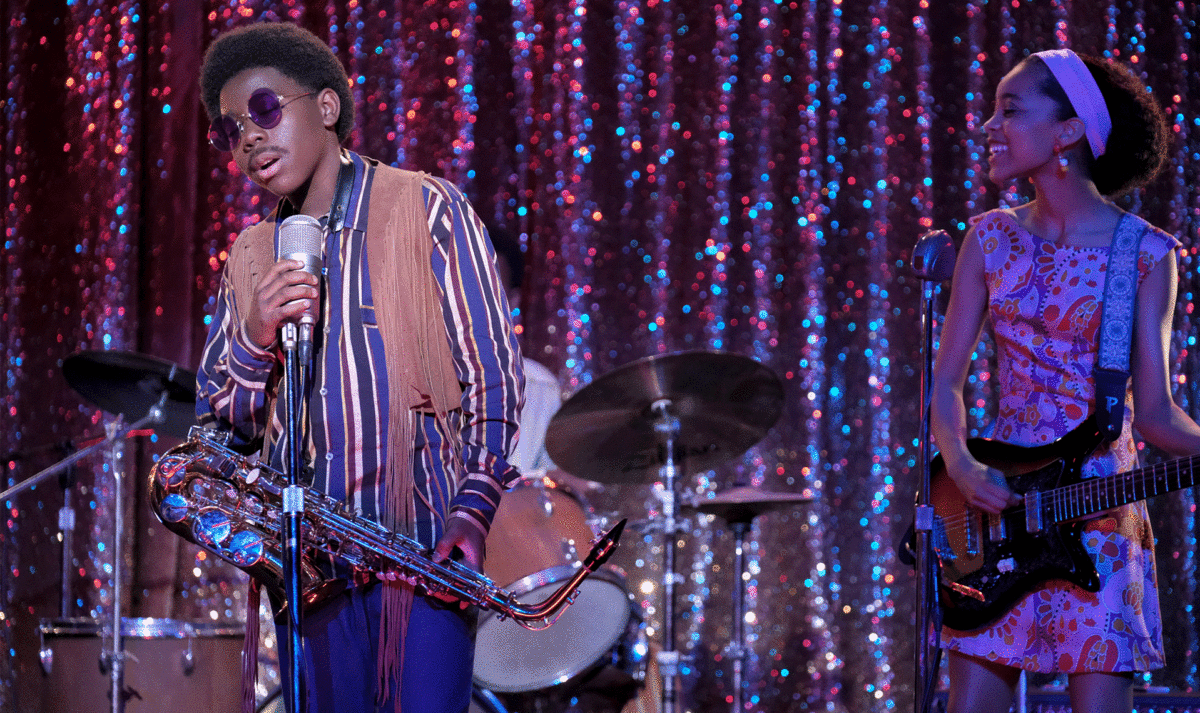
What’s your relationship to the original Wonder Years show and its soundtrack by Snuffy Walden? Did it have any influence on the new soundtrack?
Yoffee: Yes, 100%. I think we both had a crush on Winnie Cooper! I remember watching that show after school and I didn’t know at the time that the theme song was famous. I didn’t understand music licensing at the time, so I was like “Oh, that’s the song from The Wonder Years” not “They licensed that Joe Cocker song for The Wonder Years.” Snuffy Walden’s guitar work is so inspiring. There was a big discussion at the beginning of this, especially with Fred Savage, about how we were going to approach the soundtrack. It’s a bit of trial and error, and a balance between drama and comedy. As an ABC show in 2021, there are a lot of people who have expectations about that. How do you mark the comedy? How heavy-handed should you be with the drama? The rules and how we react to the narrative in 2021 is different than it was in 1988. In working with the material, we’ve changed course a little bit, but at the beginning Snuffy was very much a big inspiration and a topic for music direction.
Hylton: We all went into the show with a little bit of baggage, right? Not bad baggage, more just what we thought the show should be. In the beginning, we had so many different iterations of lots of music we sent over – when you think of The Wonder Years, you think of 1968, you think of this, you think of that, there’s all these little niches and nuances you want to hit. Then when you literally see the actors and the story on-screen, you’re like, “Oh, this is what’s actually missing from this scene or from that episode.” And that’s been kind of magic to watch unfold.
It sounds like a real balancing act. You have to create sounds that capture this time period, but it’s also a world that’s new to these characters. How do you approach making nostalgic sounds feel fresh?
Yoffee: We talk about that every day. Working with certain instruments and within that kind of style I think gives it the nostalgia. We did, and still do, experiment with analog approaches: recording to tape, tape emulation, analog filtering. We have to decide in the moment, “Is this commenting on this like it’s a memory? Is it too much nostalgia?” We do want it to feel visceral in the moment – we’re experiencing these things with the characters in real time. That’s really important so the show feels fresh and urgent, rather than looking back. Every episode thus far has presented something like “Oh wait, that didn’t work in the last episode, but it would work here.”
Hylton: Something Snuffy did really well was using singular instruments, especially a lot of acoustic guitar. That allows the story to be timeless. That’s something we played with a lot: how are we going to make this “of the moment” for the characters but a reminder of a beautiful time for the viewer? With the songs that we’ve produced [that live inside] the show, we want it to sound of that time and record in that style with the band. But with the score, we balance both, because you don’t want to be locked into something that sounds nostalgic for the run of the series. You want to make sure that it’s timeless in its own way.
Yoffee: Even just electric bass is such an emotive instrument. A musician can play a bassline and it can sound like classic rock or it can sound like Motown or funk. It’s about the way you’re sliding between the notes, how it’s mixed, how the highs and the lows are accented. Is it warm? Are you plucking really hard? Are you using your finger pad? These subtle variations make all the difference. The devil is in the details. We could write a cue that sounds modern, but if it’s played as if it was written and performed by a Motown rhythm section in 1968, that’s the world we’re sort of living inside.
“The mixer inside Abbey Road is amazing. The fact that you can go in and tweak the mics for the individual pieces of the kit is just fantastic.”
– Jacob Yoffee
One of the most exciting elements of the show is Dulé Hill’s character Bill, who is a music professor as well as a working musician. Did that narrative focus on music inside the household inform how you approached the work?
Yoffee: In the pilot, you know when the family is hearing his song play on the radio? We produced that, and that’s actually Dulé Hill singing it. [Patterson]’s father actually wrote that in the 1960s. It was originally recorded by Eula Cooper, so we transcribed the recording.
Hylton: When we first saw the script and how much music was involved in Bill’s life, we were like “Man, this is such a beautiful canvas.” I personally love finding melody on bass. There’s another show we got to work on, Kevin Hart’s series, and the way we interpreted how we were going to do that show was, “Okay, what instrument would Kevin Hart be?” For this show, we wondered what instrument communicates what Bill would communicate? In the show, Dean plays saxophone so we were like, “Man, there’s so much music we can involve and evolve as the series goes on.” To answer your question, it was definitely an integral part from the beginning, both as part of the plot and part of how this father and son relate to each other through music.
Do you have any favorite cues? And with so many ups and down of growing up captured in the show, were there any cues you saw where you remembered something similar happening in your own childhood?
Hylton: The first cue that’s my favorite by far is the cue after MLK dies.
Is that when the choir comes in? There’s those haunting, cavernous vocals.
Hylton: Yeah, and to Jacob’s point about control, we restrained you from hearing vocals within the score until that moment. We’ve been working with a great friend of mine, Scotty Grand. He laid down this soulful, hymn-like melody when Saycon comes in folding the laundry after hearing about Martin Luther King’s death. Her face acting in that moment is just amazing – it gives you chills. That’s my favorite cue by far. As far as one that relates to me, I don’t want to ruin it, but there’s a moment when Dean is the only black kid in a class full of white kids… they’re just staring at him and it’s hilarious but it’s like, I relate.
Yoffee: My favorite was the MLK cue for those same reasons. And the heartbreak scene, where he sees the girl kissing the other guy – that definitely happens, it brings you back. [laughs] I love the writing on the show and feel like it hits the heart, but it’s quick to follow up with humor. There’s some great sound cues coming. We just love being able to explore certain sound worlds with horns and the band and getting to really just flex; and we’ve got some ‘70s fusion jazz coming in another episode so that was just a thrill. I’m just like, “Oh my god, we’re getting away with getting to write such good music!”
Watch The Wonder Years on Wednesday nights at 8:30PM Eastern time on the ABC Network or via the website.








